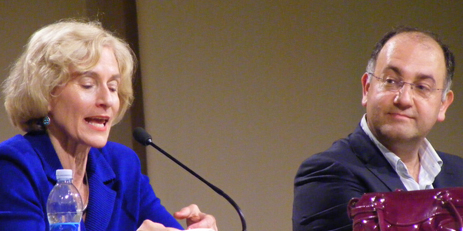Marta Nussbaum
06 giugno 2011

Public Emotions
and the Decent Society
Marta Nussbaum
Ernst Freund Distinguished Service
Professor of Law and Ethics,
University of Chicago
Moonday 6 june 2011 6:00 PM,
Loppiano Auditorium
Martha Nussbaum was the keynote speaker at the fifth appointment in the “Lecture Series of Sophia.” In a full day at Loppiano, the philosopher – one of the most influential today – was able to see the different points of the small town and of the University Institute, where she first met a group of professors and then students for a moment of open dialogue. “Sophia offers a type of interdisciplinary education that is crucial in the formation of citizens of the world: if we limit ourselves to only one field of knowledge, one is not sufficiently armed in this sense,” she commented. At the conference open to the public, Nussbaum spoke of “Public Sentiments and a Decent Society,” one of the latest developments in her thought.
Scholar of Greek and Roman Philosophy, as well as Politics and Ethics, Nussbaum taught at both Harvard and Oxford University, and is currently Director of the Law and Ethics Chair at the University of Chicago. Throughout her career, she has received 32 Honorary Doctorates. At the beginning of her academic journey, she went to Florence to study Aristotle, a city which she saw again during her visit to the UIS.
As the Professor Luigino Bruni underlined in the introduction of the Lecture, one of her most important books is “The Fragility of Goodness”, Il Mulino, 1986, “ because she rediscovers some of the particularities of Aristotle, of the fragility of human beings and of relational goods, essential for humanity.”
Another important aspect of her work is the “capabilities approach,” elaborated together with the Nobel laureate Amartya Sen, who greatly influenced the conception of the Indicators of Human Development utilized by the UN. In a few words, the idea consists in defining the fundamental needs – that is, the capacities – that must be guaranteed to every human being: life, health, physical integrity, senses and imagination, thought, emotions, practical reason, union, relationships with animals and plants, and play. For her, it is essential not to reduce the humanistic education of persons. “Without literature, the arts and philosophy, we do not have good citizens,” explained Bruni.
Also the theme of justice is central to the thinking of Nussbaum. Critiquing her teacher, John Rawls, she sustains that the social contract does not guarantee mutual advantage, because it does not take into consideration those who are disadvantaged, as well as animals and the relationship between wealthy and non-wealthy nations.
In the conference on “Public Sentiments and a Decent Society, ” Nussbaum proposed a simultaneous critical and sentimental approach, for a society that aims at the common good. The philosopher built her talk on the comparison between the positivist thought of Auguste Comte, the reflections of the British philosopher John Stuart Mill, and that of the Indian Rabindranath Tagore.
She began from the supposition that after the French Revolution there was an obstinate search for values that could be the glue for new regimes, no longer based on the authority of the monarchy or on fearful obedience. Therefore, the political thinking of the 1900s turned to the question of public sentiments: “It was widely agreed upon that the building of decent and stable democracies depends on the fight against narcissism and the extension of sympathy. In addition, this new culture of public sentiments has to both support the democracies an accompany the aspirations of nations for justice and global peace,” explained Nussbaum.



